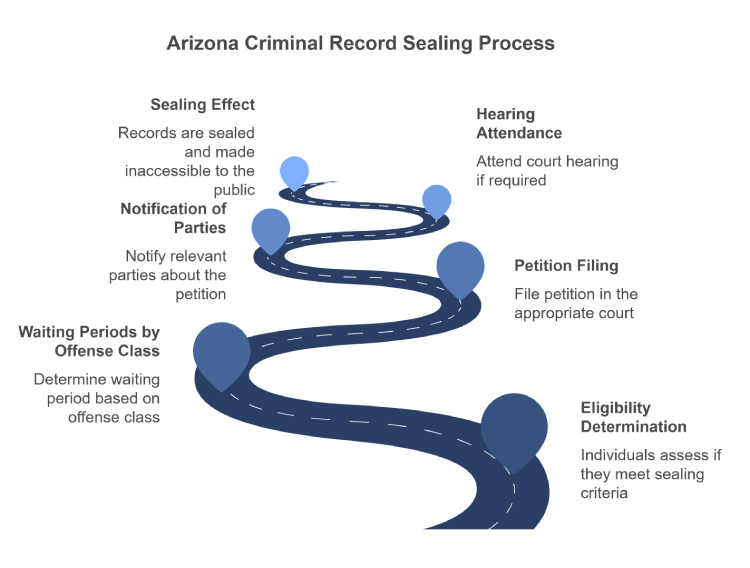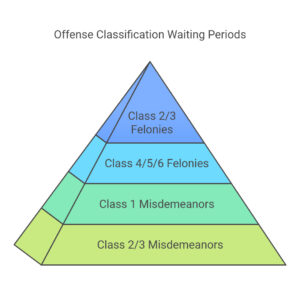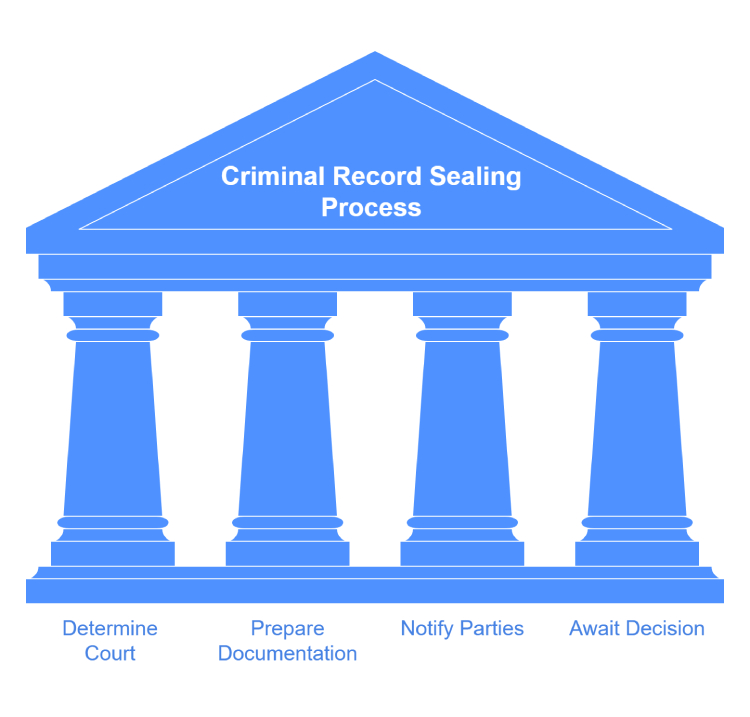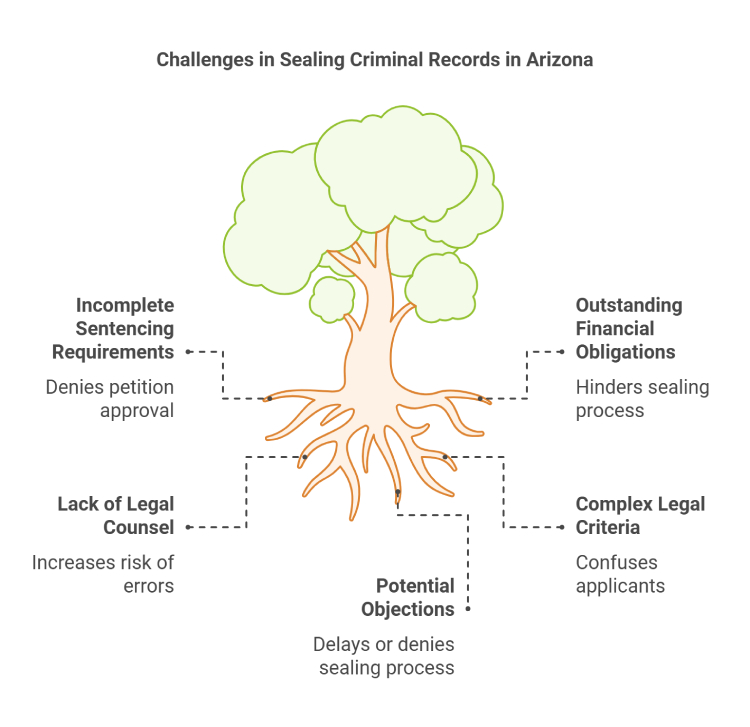Navigating Arizona’s Criminal Record Sealing Process Under A.R.S. § 13-911
Key Points
- Eligibility for Sealing Records: Individuals may petition to seal their criminal records if they have completed all sentencing terms, including fines and restitution, and have observed the requisite waiting periods based on the offense classification.
- Waiting Periods by Offense Class:
- Class 2 or 3 Felonies: 10-year waiting period.
- Class 4, 5, or 6 Felonies: 5-year waiting period.
- Class 1 Misdemeanors: 3-year waiting period.
- Class 2 or 3 Misdemeanors: 2-year waiting period.
- Petition Process: Involves filing in the appropriate court, notifying relevant parties, and potentially attending a hearing.
- Effects of Sealing: Sealed records are inaccessible to the public but remain available to certain entities; individuals can legally assert non-involvement in the sealed offense under specific conditions.
- Exceptions: Certain offenses, such as dangerous offenses and crimes involving minors, may not be eligible for sealing.

Table of Contents
ToggleImportant Definitions
- Sealing of Records: Restricting public access to criminal records while allowing access for specific entities under defined circumstances.
- Expungement: The process of erasing a criminal record entirely, making it as though the offense never occurred.
- Setting Aside a Conviction: Nullifying a conviction, indicating that the judgment is vacated, but the record remains accessible.
- Dangerous Offense: An offense involving the discharge, use, or threatening exhibition of a deadly weapon or dangerous instrument, or the intentional or knowing infliction of serious physical injury.
- Waiting Period: The mandated time that must elapse after completing all sentencing terms before a petition to seal records can be filed.
A criminal record can significantly impact various aspects of life, including employment opportunities, housing applications, and personal relationships. In Arizona, individuals have the opportunity to petition for the sealing of their criminal records under Arizona Revised Statutes (A.R.S.) § 13-911. This legal provision allows eligible individuals to restrict public access to their criminal records, thereby facilitating a fresh start.
Understanding A.R.S. § 13-911
A.R.S. § 13-911 provides a legal mechanism for individuals to petition the court to seal their arrest, conviction, and sentencing records. It’s important to distinguish this process from other legal remedies such as expungement or setting aside convictions. Sealing a record under this statute means that the records are not accessible to the public but can still be accessed by certain entities under specific circumstances.
Eligibility Criteria for Sealing Records
To be eligible to petition for the sealing of criminal records under A.R.S. § 13-911, individuals must meet certain conditions:
- Completion of Sentence: All terms and conditions of the sentence, including the payment of fines and restitution, must be fully satisfied.
- Dismissal or Acquittal: Cases where charges were dismissed or resulted in a not guilty verdict are eligible.
- No Charges Filed: Arrests that did not lead to formal charges can also be considered.
Additionally, specific waiting periods apply based on the classification of the offense:

- Ten Years: For Class 2 or 3 felonies.
- Five Years: For Class 4, 5, or 6 felonies.
- Three Years: For Class 1 misdemeanors.
- Two Years: For Class 2 or 3 misdemeanors.
These waiting periods commence after the completion of all sentencing terms and conditions.
Examples of Offenses by Classification
Understanding the classification of offenses is crucial, as it determines the applicable waiting period for petitioning to seal records. Here are examples of offenses under each classification in Arizona:
- Class 1 Felonies:
- First-degree murder.
- Second-degree murder.
- Class 2 Felonies:
- Manslaughter.
- Sexual assault.
- Armed robbery.
- Class 3 Felonies:
- Residential burglary.
- Assault with a deadly weapon.
- Auto theft.
- Class 4 Felonies:
- Theft of property valued between $3,000 and $4,000.
- Aggravated assault involving strangulation.
- Class 5 Felonies:
- Credit card fraud.
- Certain drug offenses.
- Class 6 Felonies:
- Possession of drug paraphernalia.
- Resisting arrest.
- Class 1 Misdemeanors:
- DUI offenses.
- Assault without serious injury.
- Class 2 Misdemeanors:
- Criminal trespass.
- Simple assault.
- Class 3 Misdemeanors:
- Loitering.
- Minor traffic violations.
The Petition Process
Filing a petition to seal criminal records involves several steps:
- Determine the Appropriate Court: File the petition in the court where the original case was adjudicated.
- Prepare Necessary Documentation: Include all relevant case information, proof of sentence completion, and any supporting materials.
- Notify Relevant Parties: Inform the prosecuting agency and any victims involved in the case, as they have the right to object to the petition.
- Await Court Decision: The court will review the petition, and a hearing may be scheduled. The judge will consider factors such as the nature of the offense, time elapsed since completion of the sentence, and any objections raised.

Effects of Sealing Records
Sealing criminal records under A.R.S. § 13-911 has several implications:
- Legal Implications:
- Individuals can legally state that they have never been arrested for, charged with, or convicted of the sealed offense, except under specific circumstances outlined in the statute.
- Certain civil rights may be restored, depending on the nature of the offense and other legal provisions.
- Practical Benefits:
- Enhanced employment opportunities, as sealed records are not accessible during standard background checks.
- Improved housing prospects, with landlords unable to view sealed records.
- Overall betterment of personal reputation and societal reintegration.
Exceptions and Limitations
While sealing records offers significant benefits, there are exceptions:
- Access by Certain Entities:
- Law enforcement agencies, courts, and prosecutors may still access sealed records for specific purposes.
- Certain employers, especially those requiring fingerprint clearance cards, may have the right to inquire about sealed records.
- Ineligible Offenses:
- Dangerous offenses, serious offenses, and crimes involving minors or vulnerable adults may be excluded from eligibility for sealing.
Practical Considerations and Challenges
Navigating the process of sealing criminal records in Arizona involves several critical considerations:
- Ensuring Complete Compliance:
- Fulfillment of Sentencing Terms: It’s imperative to complete all non-monetary conditions of the sentence, such as community service or probation requirements.
- Financial Obligations: All fines, fees, and restitution must be paid in full before filing a petition.
- Potential Obstacles:
- Incomplete Sentencing Requirements: Failure to meet all sentencing conditions can result in the denial of the petition.
- Outstanding Financial Obligations: Unpaid fines or restitution can hinder the sealing process.
- Importance of Legal Counsel:
- Navigating Legal Complexities: Engaging an attorney can help in understanding eligibility criteria and ensuring accurate petition preparation.
- Advocacy: Legal representation can be crucial, especially if objections arise from prosecutors or victims.

The Bottom Line
Sealing criminal records under A.R.S. § 13-911 offers a pathway to mitigate the long-term impacts of a criminal history. By comprehending eligibility requirements, adhering to the petition process, and seeking legal guidance, individuals can work towards a future unencumbered by past records.
Frequently Asked Questions (FAQs)
- What does it mean to seal a criminal record in Arizona?Sealing a record restricts public access to it, though certain entities, such as law enforcement and specific employers, may still have access under defined circumstances.
- How does sealing differ from expungement or setting aside a conviction?Sealing limits public access to records; expungement typically erases the record entirely, while setting aside a conviction nullifies the judgment but doesn’t remove the record from public access.
- Are there offenses that cannot be sealed under A.R.S. § 13-911?Yes, certain offenses, including dangerous offenses and crimes involving minors, may be ineligible for sealing.
- Can I file a petition without an attorney?While it’s possible to file a petition pro se, consulting with an attorney is advisable to navigate the legal complexities effectively.
- What happens if my petition is denied?If denied, you may reapply after a specified period or address the reasons for denial and submit a new petition.
- Will sealing my record restore my firearm rights?Sealing a record does not automatically restore firearm rights; a separate legal process is required for restoration.
- How long does the sealing process take?The duration varies based on court schedules and case specifics; consulting with legal counsel can provide a more accurate timeline.
- Can sealed records be reopened?Sealed records can be accessed by certain entities under specific legal circumstances, such as law enforcement investigations.
- Will sealing my record affect my immigration status?Sealing a record does not alter immigration status; it’s essential to consult with an immigration attorney regarding such matters.
- Is the sealing process the same across all Arizona counties?
While A.R.S. § 13-911 provides a statewide framework, procedural nuances may vary by county; local court rules should be consulted.
By addressing these considerations and seeking appropriate legal guidance, individuals can effectively navigate the process of sealing criminal records in Arizona, thereby enhancing their prospects for a better future.


